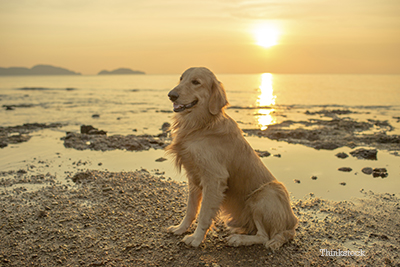
Dr. Ruth MacPete talks about the importance of protecting your pet's skin from the sun's harmful rays. For more from Dr. MacPete, find her on Facebook or at www.drruthpetvet.com!
Did you know pets get skin cancer too? Just like us, dogs and cats are susceptible to sun damage. Excess sun exposure can lead to sunburns and skin cancer in our animal friends.
Most dogs and cats have hair that protects them from sun damage. However, hairless cat and dog breeds, like the Sphynx and Mexican Hairless dog, respectively, are highly susceptible to sunburns and skin cancer. In addition, it is important to realize that even pets with hair can be vulnerable to the sun’s harmful rays. Areas like the ears, nose, lips, eyelids and belly often have little to no hair on them and thus are very susceptible to sun damage. Also, pets with light skin and short or thin hair, like white cats, are also more susceptible to developing skin cancer, especially if they spend a lot of time outdoors. So what can you do to protect your pets this summer?
vulnerable to the sun’s harmful rays. Areas like the ears, nose, lips, eyelids and belly often have little to no hair on them and thus are very susceptible to sun damage. Also, pets with light skin and short or thin hair, like white cats, are also more susceptible to developing skin cancer, especially if they spend a lot of time outdoors. So what can you do to protect your pets this summer?
Minimize Exposure
Keep your pets indoors when the sun is strongest. This is usually in the afternoon between 11 am to 3 pm, but obviously depends on where you live. A good rule of thumb is if it is peak tanning hour this is not when you want your pet outside.
Solar Wear
If your pet seems to worship the sun and always wants to lie down in full-sun to catch some rays, consider protective clothing. Yes, I did say clothing. There are several companies that make pet clothing with solar protection. You can also use a light t-shirt to help cover hairless bellies.
Sunscreen
If your pet can’t stay out of the sun or you can’t dress your pet in protective sun wear, consider using pet sunscreen on your pet’s ear tips, nose and other areas vulnerable to sun damage. Just make sure to avoid getting it in their eyes. Many human sunscreens contain ingredients that can be toxic if your pet licks it off or ingests the sunscreen. I recommend only using a veterinary approved sunscreen like Doggles Sunscreen or Epi-Pet Sun Protector Sunscreen for dogs. But before you lather your pet, a few words of caution:
Sunscreens containing zinc oxide can be toxic if ingested and never use a product on a cat unless it is clearly labeled for use in cats. Sunscreens containing Octyl Salicylate, Homosalate, and Ethylhexyl Salicylate (common ingredients in sunscreens) can be toxic to cats. So before you reach for the sunscreen, I always recommend you check with your vet to be sure it is ok for your particular pet.
Make sure you follow these precautions this summer, especially if you have a pet at risk for skin cancer. Be on the lookout for suspicious skin lesions and take your pet to the veterinarian if you have any concerns. Diagnosing skin cancer early can lead to a better prognosis. Protect yourself from the sun’s damaging rays this summer, but don’t forget to protect your pet too!
If you have any questions or concerns, you should always visit or call your veterinarian – they are your best resource to ensure the health and well-being of your pets.
